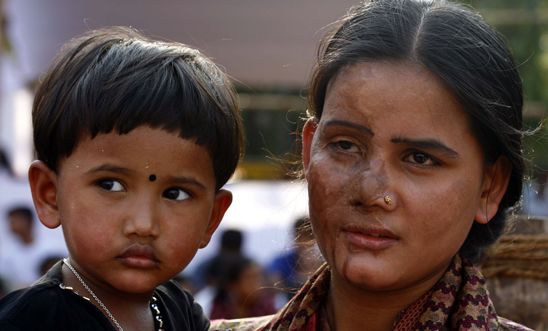
Violence against women

'I woke up to find a man undressing me. I tried to scream but he grabbed me by the throat so that I could not scream. My four-year-old cousin woke up and he told her to be silent. He did his business and then ran away.'
14-year old Fartun, Mogadishu
Violence against women, or gender-based violence, is a worldwide problem - and it's everyone's problem. It exists in virtually every culture on earth.
'violence against women is a global health problem of epidemic proportions'
Dr Margaret Chan, World Health Organisation Director-General
One in three women will experience violence in her lifetime. Her experience will deprive her of human rights, put her at risk of mental and physical health problems, and potentially trap her in poverty.
What do we mean by violence against women?
We follow the UN definition which describes violence against women as
'any act of gender-based violence that results in, or is likely to result in, physical, sexual or psychological harm or suffering to women, including threats of such acts, coercion or arbitrary deprivation of liberty, whether occurring in public or in private life.'
UN Declaration on the Elimination of Violence Against Women
It can include
- domestic abuse
- sexual violence and rape
- stalking and harrassment
- trafficking of women
- female genital mutilation
- intimidation and harassment at work, in education or in public
- forced prostitution
- forced marriage
- ‘honour’ crimes.
It's a human rights issue
Violence against women is both a consequence of and a cause of inequality between men and women. As well as being a health problem of epidemic proportions, it's also a human rights problem of equal severity. Depending on the violation, it can deprive a woman of
- her right to health and physical and mental integrity
- her right to be free from torture, inhuman and degrading treatment
- her right to life.
While those rights are enshrined in the Universal Declaration of Human Rights, there are also specific pieces of international legilsation that protect a woman's right to be free from violence.
- The UN Convention on the Elimination of All Forms of Discrimination against Women (CEDAW), adopted by the UN General Assembly in 1979, defines how UN member states should define and act to stop discrimination against women.
- In 1993 the General Assembly passed the Declaration on the Elimination of Violence Against Women (EVAW) which recognised that violence against women is widespread, that it comes from a historically unequal relationship between men and women, and that it is used as a mechanism to subordinate women. The Declaration called on UN member states to work together to eliminate an issue that is 'an obstacle to the achievement of equality, development and peace'.
It is the state's responsibility to protect women living there from violence, even domestic abuse behind closed doors.. Authorities can do this by creating national laws that criminalise violent acts against women, providing support services like safe sheltered accommodation for women who need it, and making sure that crimes can be reported and prosecuted safely and justly. Sometimes this includes working to change public attitudes and challenging the stigma around reporting violent crime.
Violence in relationships
Domestic abuse disproportionately affects women, at the hands of men.
'Gender is the most significant factor for being a perpetrator or victim of domestic violence in particular'
Respect
Although we have some statistics around domestic violence, it's difficult to know just how many women are affected by this notoriously under-reported issue. But the information we do have gives a glimpse into just how widespread this deadly issue is:
- 35% of women in the world in 2013 have experienced violence. That could be physical or sexual violence from someone they know, or sexual violence from a stranger.
- Nearly a third of women who've been in a relationship have experienced physical and/or sexual violence at the hands of their partner.
- 38% of murders of women are committed by their partners - all according to the World Health Organisation.
In the UK
- Two women are killed by their partner every week in England and Wales. Of all female homicides, 40% are killed by gendered violence.
- The UK police receive a call every minute about domestc abuse, 89% of which are about a woman being abused by a man.
- Only 24% cases of domestic violence are actually reported, say Women's Aid.
As well as the obvious human rights and health repercussions of domestic abuse, violence at home has economic implications. A woman may experience violence because she lives in poverty, but she may also experience poverty as a result of violent crimes. A study in India found that women lose around five paid work days for every incident of domestic violence.
Violence in conflict
'It is now more dangerous to be a woman than to be a soldier in conflict.'
Major General Patrick Carnmaert, former UN Peacekeeping Operation commander in DRC
Rape and sexual abuse have been used as weapons of war throughout history. The lack of stability and security leaves women and girls in particular more vulnerable than ever to violence. But for a long time it was just accepted that this was inevitable where conflict was happening, and few efforts were made to prosecute perpetrators for mass rapes and sexual violence.
The Geneva Convention has in theory protected individuals from rape and threatened acts of violence in conflict zones since 1946. Only in 1998 did the UN pass a resolution classing sexual violence in conflict, including rape, as a war crime.